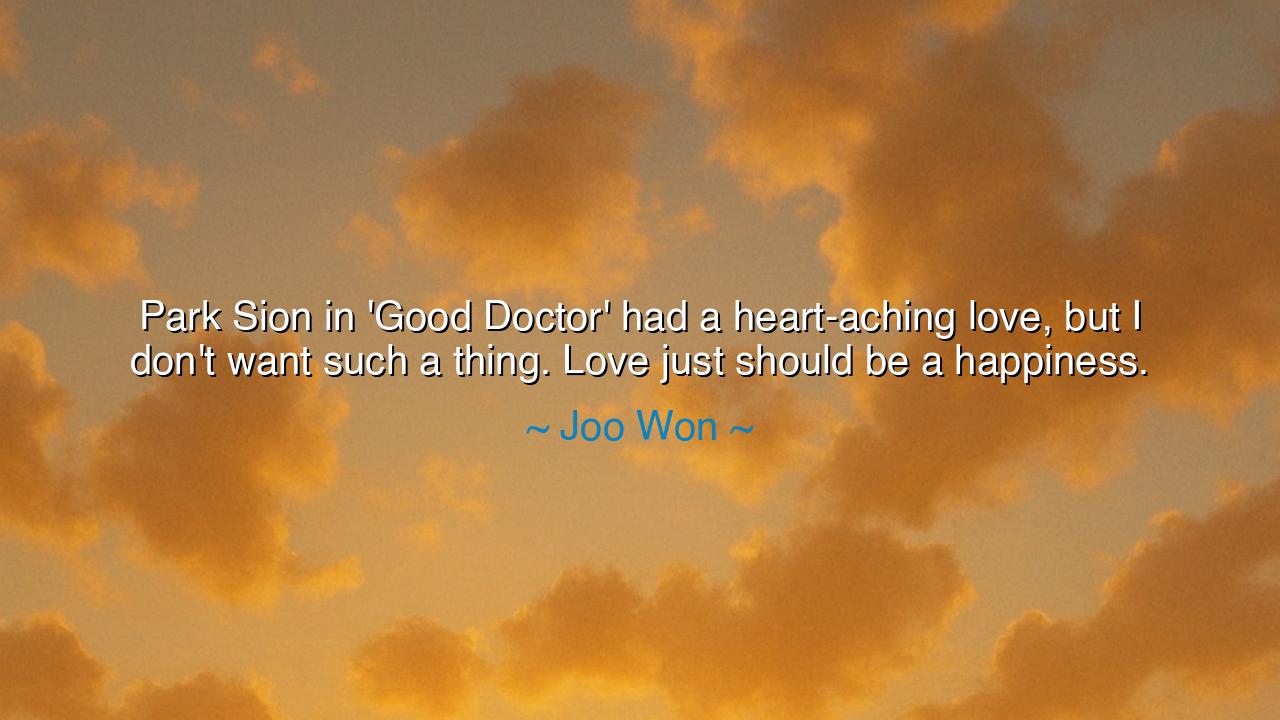
Park Sion in 'Good Doctor' had a heart-aching love, but I don't
Park Sion in 'Good Doctor' had a heart-aching love, but I don't want such a thing. Love just should be a happiness.






In the words of Joo Won, “Park Sion in ‘Good Doctor’ had a heart-aching love, but I don’t want such a thing. Love just should be a happiness.” These words, though gentle, carry the weight of ancient truth. They speak of the human longing for love without sorrow, of tenderness untainted by despair. For too long, the poets of the world have sung of love as suffering — a fire that burns as it warms, a storm that both destroys and awakens. But here, Joo Won reminds us of another kind of love, the kind that heals rather than wounds, the kind that lifts instead of binds. It is not a love born of longing, but of peace — the love that is happiness.
In the drama Good Doctor, the character Park Sion is a man of innocence and purity, whose love is as selfless as it is painful. His heart yearns quietly, carrying affection like a wound that never fully heals. It is the kind of love that the world often praises — noble, tragic, unforgettable. Yet Joo Won, who embodied this role, saw through the veil of romance to the deeper truth beneath it. He knew that love should not be a source of suffering, but a sanctuary of joy. His words echo the wisdom of those who have learned that not all pain is beautiful, and not all beauty must come with pain.
The ancients, too, wrestled with this truth. The Greeks spoke of Eros, the fiery, consuming passion that could drive mortals to madness, and of Agape, the serene love that flows from understanding and goodwill. The former makes heroes of men and martyrs of lovers, but the latter builds worlds that endure. The wise sought balance between the two — to love deeply, yet gently; to give oneself, but not to lose oneself. In this, Joo Won’s words find kinship with the philosophers of old. For he does not reject love itself, but the torment that often masquerades as love. He seeks the kind of affection that nourishes the soul, not the kind that drains it.
Let us remember the story of Emperor Ashoka, the warrior who, after countless battles, found himself standing amidst ruin. Once he conquered lands through might; later, he sought to conquer hearts through compassion. When he turned away from the sword to embrace peace, he discovered that the truest power is not in domination, but in harmony. Likewise, the truest love is not in possessing or aching for another, but in finding peace in their presence. This is the love Joo Won speaks of — the kind that neither burns nor fades, but glows with steady warmth.
We have been taught by countless tales that love must be a battlefield — that if it doesn’t hurt, it isn’t real. But this is a cruel inheritance. The heart is not a warrior’s field; it is a garden. It does not need blood to bloom; it needs care. The heart-aching love of Park Sion moves us because it shows devotion, but we must not confuse suffering with depth. True love, as Joo Won reminds us, should be happiness — a quiet joy that makes both souls lighter. It is the laughter shared, the silence understood, the presence that comforts without demand.
The lesson, then, is clear: seek not the love that consumes, but the love that completes. Do not chase passion so fierce it leaves you hollow; instead, build companionship so kind it fills your life with calm strength. To love in this way is not weakness — it is wisdom. For those who have loved and lost know that the greatest gift love can give is peace, not pain. The ancients would say: “The strongest flame is not the one that burns brightest, but the one that never burns out.”
So, dear listener, when you love, let it be a happiness — not a torment disguised as poetry. Let your heart be soft, not broken; generous, not enslaved. Love should not cost you yourself. It should bring you closer to your truest self. Let go of the illusion that love must hurt to be real. Instead, walk the gentler path — love as the morning sun loves the earth: steadily, warmly, and without expectation. For in that quiet radiance lies the love that endures beyond time — the love that is not heartache, but healing.






AAdministratorAdministrator
Welcome, honored guests. Please leave a comment, we will respond soon